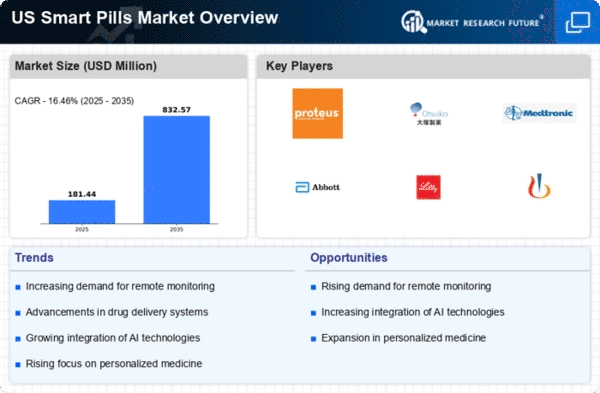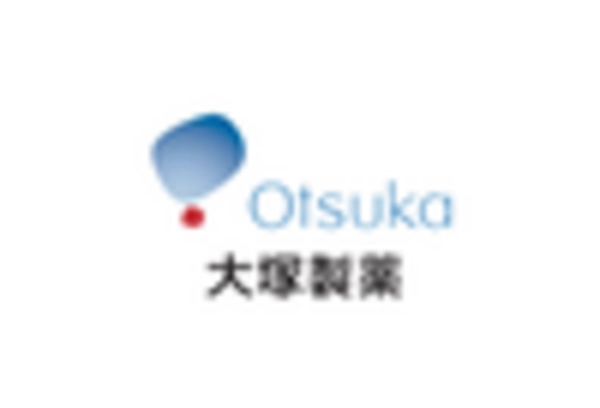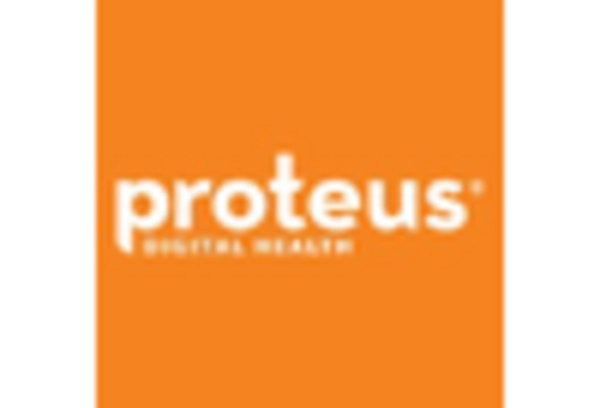Advancements in Drug Delivery Systems
Advancements in drug delivery systems are playing a pivotal role in shaping the smart pills market. Innovations in nanotechnology and microencapsulation techniques are enabling the development of smart pills that can deliver medications more efficiently and effectively. These advancements not only enhance the bioavailability of drugs but also allow for controlled release mechanisms, improving patient compliance. The smart pills market is expected to benefit from these technological breakthroughs, as they provide healthcare professionals with new tools to optimize treatment regimens. As the demand for more effective drug delivery solutions continues to rise, the smart pills market is likely to expand, driven by the need for innovative therapies that address complex health challenges.
Growing Focus on Medication Adherence
The growing focus on medication adherence is a significant driver of the smart pills market. Non-adherence to prescribed medication regimens is a widespread issue, leading to poor health outcomes and increased healthcare costs. Recent studies indicate that nearly 50% of patients do not take their medications as prescribed, underscoring the need for solutions that enhance adherence. Smart pills, equipped with tracking and reminder features, offer a promising approach to address this challenge. By providing real-time feedback and alerts, these innovative solutions can help patients stay on track with their treatment plans. As healthcare stakeholders prioritize strategies to improve medication adherence, the smart pills market is likely to see substantial growth, driven by the demand for effective adherence solutions.
Rising Demand for Personalized Medicine
The smart pills market is experiencing a notable surge in demand for personalized medicine, driven by advancements in genomics and biotechnology. Patients increasingly seek tailored treatment options that align with their unique genetic profiles. This trend is reflected in the growing number of smart pills designed to deliver targeted therapies, enhancing treatment efficacy. According to recent estimates, the personalized medicine market is projected to reach $2.4 trillion by 2025, indicating a robust growth trajectory. As healthcare providers adopt more individualized approaches, the smart pills market is likely to expand, catering to the specific needs of patients. This shift towards personalized medicine not only improves patient outcomes but also fosters greater patient engagement, thereby propelling the smart pills market forward.
Increasing Prevalence of Chronic Diseases
The rising prevalence of chronic diseases in the US is a critical driver of the smart pills market. Conditions such as diabetes, hypertension, and cardiovascular diseases are becoming increasingly common, necessitating effective management strategies. According to the Centers for Disease Control and Prevention (CDC), approximately 6 in 10 adults in the US have a chronic disease, highlighting the urgent need for innovative treatment options. Smart pills offer a promising solution by enabling patients to manage their conditions more effectively through real-time data collection and personalized feedback. This growing demand for chronic disease management solutions is likely to propel the smart pills market, as healthcare providers seek to improve patient outcomes and reduce healthcare costs.
Integration of Digital Health Technologies
The integration of digital health technologies into the healthcare ecosystem is significantly influencing the smart pills market. With the proliferation of mobile health applications and wearable devices, patients are increasingly empowered to monitor their health and medication adherence. This trend is supported by data indicating that approximately 70% of patients express a preference for digital health solutions that enhance their treatment experience. Smart pills, equipped with digital tracking capabilities, enable real-time monitoring of medication intake, thereby improving adherence rates. As healthcare systems in the US continue to embrace digital transformation, the smart pills market is poised for growth, driven by the demand for innovative solutions that enhance patient care and streamline healthcare delivery.

















